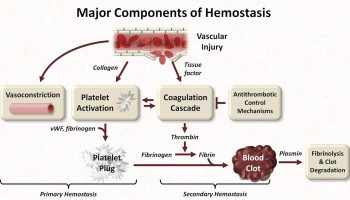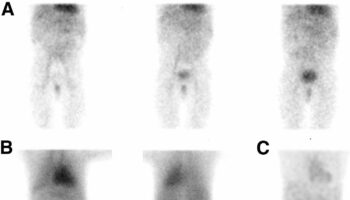What is alpha fetoprotein
Alpha fetoprotein (AFP) is a protein produced by the liver in a developing baby (fetus) and the portion of a developing embryo that is similar to the yolk cavity in bird eggs (yolk sac tissues) during pregnancy. Alpha fetoprotein levels are typically elevated when a baby is born and then decline rapidly. Alpha fetoprotein levels go down to very low levels by the age of 1. Healthy adults should have very low levels of alpha fetoprotein. It is likely that alpha fetoprotein has no normal function in adults. A blood test can be done to measure the amount of alpha fetoprotein in your blood.
Liver damage and certain cancers can increase alpha fetoprotein concentrations significantly.
Alpha fetoprotein is produced whenever liver cells are regenerating. With chronic liver diseases, such as hepatitis and cirrhosis, alpha fetoprotein may be chronically elevated. Very high concentrations of alpha fetoprotein may be produced by certain tumors. This characteristic makes the alpha fetoprotein test useful as a tumor marker. Increased amounts of alpha fetoprotein are found in many people with a type of liver cancer called hepatocellular carcinoma and in a liver cancer occurring in infants called hepatoblastoma. Alpha fetoprotein are also found in some people with cancers of the testicles or ovaries.
Alpha fetoprotein exists in several different variants. The standard alpha fetoprotein test is for a total alpha fetoprotein, one that measures all of the alpha fetoprotein variants together. This is the primary alpha fetoprotein test used in the United States.
One of the alpha fetoprotein variants is called L3 because of its ability, in the laboratory, to bind to a particular protein called Lens culinaris agglutinin. The alpha fetoprotein-L3 Percent (AFP-L3%) test is a relatively new test that compares the amount of alpha fetoprotein-L3 to the total amount of alpha fetoprotein. An increase in the percentage of L3 is associated with increased risk of developing hepatocellular carcinoma in the near future and of having a poorer prognosis, as the L3-related cancers tend to be more aggressive.
Among patients with low total alpha fetoprotein, alpha fetoprotein-L3 can be higher in those with hepatocellular carcinoma than patients with benign liver diseases. Tumor markers including total alpha fetoprotein and alpha fetoprotein-L3 are used in addition to ultrasound for surveillance of hepatocellular carcinoma in Japan. This practice is different from that in the U.S. and Europe, but the two tests are occasionally ordered by healthcare practitioners in the U.S.
Not every person with increased alpha fetoprotein and alpha fetoprotein-L3 Percent (AFP-L3%) test results has cancer or will develop liver cancer. The alpha fetoprotein and alpha fetoprotein-L3 Percent (AFP-L3%) tests are not diagnostic per se; they are indicators. They must be used in conjunction with information from a medical history and physical examination as well as histopathological examination and imaging studies to look for the development of tumors.
Although these tests can provide useful information, they are not as specific or sensitive as healthcare practitioners would wish. alpha fetoprotein can temporarily increase whenever the liver is injured and regenerating, and moderate elevations can be seen with a variety of conditions. Because of this, alpha fetoprotein testing cannot be used solely to diagnose cancer. In addition, not every cancer will produce alpha fetoprotein, so a person could still have cancer even when the alpha fetoprotein is normal. For these reasons, the alpha fetoprotein test should not be used to screen the general population for cancer.
What are the risk factors for liver cancer?
Liver cancer usually occurs in people who have chronic scarring of the liver, called cirrhosis. Most commonly, this is caused by chronic infection from one of two viruses: hepatitis B or hepatitis C. Alcohol abuse also increases the risk of developing cirrhosis. Some inherited diseases, especially a disorder called hemochromatosis (in which the body absorbs too much iron, which gets deposited in liver among other organs), can cause cirrhosis and, in time, hepatocellular carcinoma, as can non-alcoholic steatohepatitis (NASH), which is fat deposition in the liver, along with inflammation and damage.
If my alpha fetoprotein is abnormal, do I need other tests?
If you have chronic liver infection or damage and your alpha fetoprotein suddenly rises, or if it is very elevated, your healthcare practitioner will usually ask for a study to look at your liver, such as an ultrasound exam, a CT scan, an MRI scan, or a biopsy for histopathological evaluation of tumor tissues. The scans can usually spot liver cancers if they are present. Your healthcare practitioner may also order a blood test for des-gamma carboxy prothrombin, which is also known as prothrombin induced by vitamin K absence-II (PIVKA-II), to help detect liver cancer and monitor patients with hepatocellular carcinoma.
Alpha fetoprotein test
Alpha-fetoprotein is used as a tumor marker to help detect and diagnose cancers of the liver, testicles, and ovaries. Tumor markers are substances made by cancer cells or by normal cells in response to cancer in the body. Though the alpha fetoprotein test is often ordered to monitor people with chronic liver diseases such as cirrhosis, chronic hepatitis B or hepatitis C because they have an increased lifetime risk of developing liver cancer, most current guidelines do not recommend this use. A healthcare practitioner may order an alpha fetoprotein test, along with imaging studies, to try to detect liver cancer when it is in its earliest and most treatable stages.
An alpha fetoprotein tumor marker test may be used to:
- Screen for problems in the baby during pregnancy. (The test is done as part of a larger set of blood tests called quadruple screen. See maternal alpha fetoprotein below)
- Help confirm or rule out a diagnosis of liver cancer or cancer of the ovaries or testicles.
- Monitor cancer treatment. alpha fetoprotein levels often go up if cancer is spreading and go down when treatment is working.
- See if cancer has returned after treatment.
- Monitor the health of people with cirrhosis or hepatitis.
High alpha fetoprotein levels don’t always mean liver cancer or cancer of the ovaries or testicles, and normal levels don’t always rule out cancer. So an alpha fetoprotein tumor marker test is not usually used by itself to screen for or diagnose cancer. But it can help diagnose cancer when used with other tests. The alpha fetoprotein test may also be used to help monitor the effectiveness of cancer treatment and to see if cancer has returned after you’ve finished treatment.
If a person has been diagnosed with liver cancer (hepatocellular carcinoma) or another form of alpha fetoprotein-producing cancer, an alpha fetoprotein test may be ordered periodically to help monitor the person’s response to therapy and to monitor for cancer recurrence.
An alpha fetoprotein-L3 Percent (AFP-L3%) is sometimes also ordered to compare the amount of the alpha fetoprotein variant called alpha fetoprotein-L3 to the total amount of alpha fetoprotein. The alpha fetoprotein-L3% test is not yet widely used in the U.S. but has gained wider acceptance in other countries such as Japan. The test is used to help evaluate the risk of developing hepatocellular carcinoma, especially in those with chronic liver disease, and also to evaluate response of hepatocellular carcinoma to treatment.
When is alpha fetoprotein ordered?
A healthcare practitioner may order an alpha fetoprotein blood test:
- When it is suspected that someone has liver cancer or certain cancers of the testicles or ovaries; cancer may be suspected when, for example, lumps are felt in the abdominal area during a physical exam or when imaging tests detect possible tumors.
- When someone who has been diagnosed with and treated for a cancer of the liver, testicles, or ovaries is being monitored for the effectiveness of treatment
- When someone is being monitored for cancer recurrence
- To follow up patients with chronic hepatitis or liver cirrhosis
An alpha fetoprotein-L3 Percent (AFP-L3%) is sometimes ordered to help evaluate the risk of liver cancer (hepatocellular carcinoma) when a person has chronic liver disease or to test the effectiveness of treatment of hepatocellular carcinoma or monitor for its recurrence.
Alpha fetoprotein normal range
The normal values in males or nonpregnant females is generally less than 40 micrograms/liter.
The examples above are common measurements for results of these tests. Normal value ranges may vary slightly among different laboratories. Some labs use different measurements or test different samples. Talk to your provider about the meaning of your specific test results.
Elevated alpha fetoprotein
Greater than normal levels of alpha fetoprotein may be due to:
- Cancer in testes, ovaries, biliary (liver secretion) tract, stomach, or pancreas
- Cirrhosis of the liver
- Liver cancer
- Malignant teratoma
- Recovery from hepatitis
- Problems during pregnancy
Maternal alpha fetoprotein
Alpha-fetoprotein is a protein produced in the liver of a developing fetus. During a baby’s development, some alpha fetoprotein passes through the placenta and into the mother’s blood. An alpha fetoprotein blood test in pregnancy is used to check a developing fetus for risk of birth defects, such as neural tube defects or Down syndrome. An alpha fetoprotein test measures the level of alpha fetoprotein in pregnant women during the second trimester of pregnancy. Too much or too little alpha fetoprotein in a mother’s blood may be sign of a birth defect or other condition. These include:
- A neural tube defect such as spina bifida, a serious condition that causes abnormal development of a developing baby’s brain and/or spine. According to the American College of Obstetricians and Gynecologists, the alpha fetoprotein test detects neural tube defects in 85% of the cases.
- Down syndrome (trisomy 21), a genetic disorder that causes intellectual disabilities and developmental delays
- Twins or multiple births, because more than one baby is producing alpha fetoprotein
- Miscalculation of due date, because alpha fetoprotein levels change during pregnancy
Alpha fetoprotein tests are often part of a series of prenatal tests called multiple marker or triple screen tests. In addition to alpha fetoprotein, a triple screen test includes tests for hCG, a hormone produced by the placenta, and estriol, a form of estrogen made by the fetus. These tests can help diagnose Down syndrome and other genetic disorders.
The American Pregnancy Association says that all pregnant women should be offered an alpha fetoprotein test sometime between the 15th and 20th week of pregnancy. The alpha fetoprotein test may be especially recommended if you:
- Have a family history of birth defects
- Are 35 years or older
- Have diabetes
Alpha fetoprotein normal range in pregnancy
Alpha-fetoprotein is a fetal protein that is initially produced in the fetal yolk sac and liver. A small amount also is produced by the gastrointestinal tract. By the end of the first trimester, nearly all of the alpha fetoprotein is produced by the fetal liver. The concentration of alpha fetoprotein peaks in fetal serum between 10 to 13 weeks. Fetal alpha fetoprotein diffuses across the placental barrier into the maternal circulation. A small amount also is transported from the amniotic cavity.
Measurement of maternal serum alpha fetoprotein values is a standard tool used in obstetrical care to identify pregnancies that may have an increased risk for neural tube defect. The screen is performed by measuring alpha fetoprotein in maternal serum and comparing this value to the median alpha fetoprotein value in an unaffected population to obtain a multiple of the median (MoM). The laboratory has established a MoM cutoff of 2.5 MoM, which classifies each screen as either screen-positive or screen-negative. A screen-positive result indicates that the value obtained exceeds the established cutoff. A positive screen does not provide a diagnosis, but indicates that further evaluation should be considered.
What do the alpha fetoprotein results in pregnancy mean?
The alpha fetoprotein concentration in maternal serum rises throughout pregnancy, from the nonpregnancy level of 0.20 ng/mL to about 250 ng/mL at 32 weeks gestation. If the fetus has an open neural tube defect, alpha fetoprotein is thought to leak directly into the amniotic fluid causing unexpectedly high concentrations of alpha fetoprotein. Subsequently, the alpha fetoprotein reaches the maternal circulation; thus producing elevated serum levels. Other fetal abnormalities such as omphalocele, gastroschisis, congenital renal disease, esophageal atresia, and other fetal distress situations such as threatened abortion and fetal demise also may show alpha fetoprotein elevations. Increased maternal serum alpha fetoprotein values also may be seen in multiple pregnancies and in unaffected singleton pregnancies in which the gestational age has been underestimated.
- If your results show higher than normal alpha fetoprotein levels, it may mean your baby has a neural tube defect such as spina bifida, a condition in which the bones of the spine don’t close around the spinal cord, or anencephaly, a condition in which the brain does not develop properly.
- If your results show lower than normal alpha fetoprotein levels, it may mean your baby has a genetic disorder such as Down syndrome, a condition that causes intellectual and developmental problems and trisomy 18 (Edwards syndrome). Risks for these syndrome disorders are only provided with the use of multiple marker screening (QUAD1 / Quad Screen [Second Trimester] Maternal, Serum).
- If your alpha fetoprotein levels are not normal, it doesn’t necessarily mean there is a problem with your baby. It may mean you are having more than one baby or that your due date is wrong. You may also get a false-positive result. That means your results show a problem, but your baby is healthy. If your results show a higher or lower than normal level of alpha fetoprotein, you will likely get more tests to help make a diagnosis.
Neural tube defects
- An alpha fetoprotein multiple of the median (MoM) <2.5 is reported as screen negative. A screen-negative result indicates that the calculated alpha-fetoprotein (alpha fetoprotein) multiple of the median (MoM) falls below the established cutoff of 2.50 MoM. A negative screen does not guarantee the absence of neural tube defects.
- Alpha fetoprotein MoMs > or =2.5 (singleton and twin pregnancies) are reported as screen positive. A screen-positive result indicates that the calculated alpha fetoprotein MoM is 2.50 MoM or greater, and may indicate an increased risk for open neural tube defects. The actual risk depends on the level of alpha fetoprotein and the individual’s pretest risk of having a child with neural tube defect based on family history, geographical location, maternal conditions such as diabetes and epilepsy, and use of folate prior to conception. A screen-positive result does not infer a definitive diagnosis of a neural tube defect, but indicates that further evaluation should be considered. Approximately 80% of pregnancies affected with an open neural tube defect have elevated alpha fetoprotein MoM values greater than 2.5.
Follow up:
- Upon receiving maternal serum screening results, all information used in the risk calculation should be reviewed for accuracy (ie, weight, diabetic status, gestational dating). If any information is incorrect the laboratory should be contacted for a recalculation of the estimated risks.
- Screen-negative results typically do not warrant further evaluation.
- Ultrasound is recommended to confirm dates for neural tube defect screen-positive results. If ultrasound yields new dates that differ by at least 7 days, a recalculation should be considered. If dates are confirmed, high-resolution ultrasound and amniocentesis (including amniotic fluid alpha fetoprotein and acetylcholinesterase measurements for neural tube defects) are typically offered.
Cautions:
- Race, weight, smoking, multiple fetus pregnancy, and insulin-dependent diabetes may affect marker concentrations. Black mothers tend to have higher alpha-fetoprotein (alpha fetoprotein) levels but lower risk of neural tube defects and are assigned to a separate alpha fetoprotein median set. Multiple of the medians (MoMs) are adjusted for maternal weight (to account for dilution effects in heavier mothers). The alpha fetoprotein is adjusted upward in insulin-dependent diabetes to account for lower values in diabetic pregnancies. Smoking results in higher second trimester maternal serum alpha fetoprotein. MoMs are adjusted accordingly to account for serum alpha fetoprotein differences in smokers.
- The alpha fetoprotein screening results are dependent on accurate information for gestation, race, insulin dependent diabetes, and weight. Inaccurate information can lead to significant alterations in the estimated risk. In particular, erroneous assessment of gestational age can result in false-positive or false-negative screen results. Because of its increased accuracy, we therefore recommend determination of gestational age by ultrasound, rather than by maternal dates alone when possible.
- A screen-negative result does not guarantee the absence of fetal defects. A screen-positive result does not provide a diagnosis, but indicates that further diagnostic testing should be considered (an unaffected fetus may have screen-positive result for unknown reasons).
- Valid measurements of alpha fetoprotein in maternal serum cannot be made after amniocentesis.
- Triplet and higher multiple pregnancies cannot be interpreted.
- Each center offering maternal serum screening to patients should establish a standard screening protocol, which provides pre- and post-screening education and appropriate follow-up for screen-positive results.





